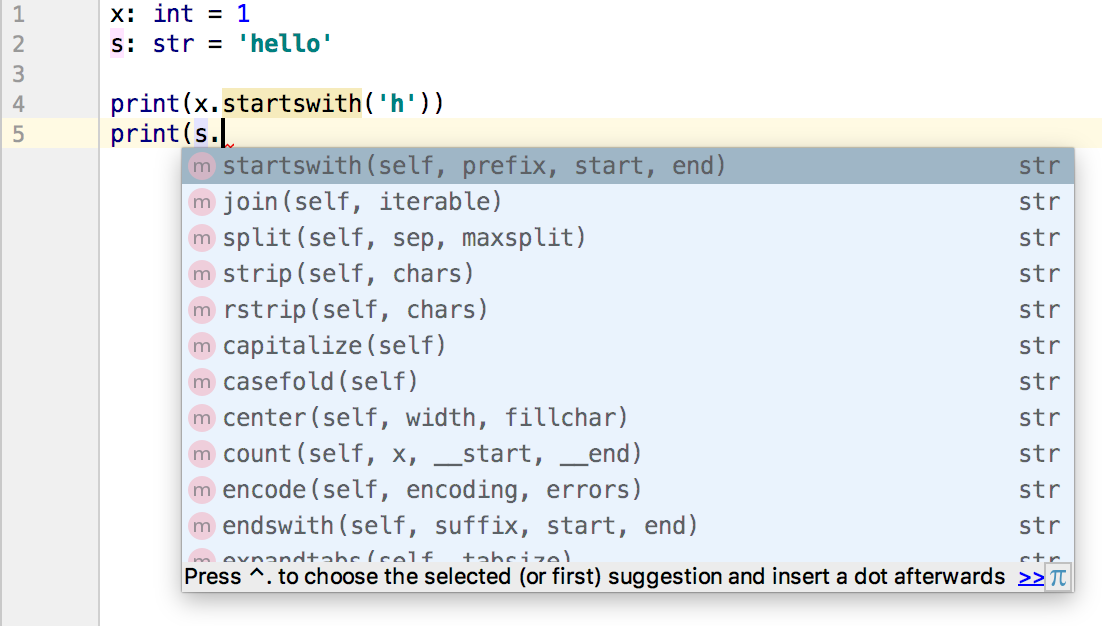Introduction to Python Type Annotations
Introduction

Illustration author - Magdalena Tomczyk
Python is a language with dynamic typing and allows us to operate quite freely with variables of different types. However, when writing code, we somehow assume which types of variables will be used (this may be caused by a restriction of the algorithm or a business logic). And for the correct operation of the program, it is important for us to find as soon as possible errors related to the transfer of data of the wrong type.
Retaining the idea of dynamic duck typing in modern versions of Python (3.6+) supports annotations for the types of variables, class fields, arguments, and return values of functions:
- PEP 3107 - Function Annotations
- PEP 484 - Type Hints
- PEP 526 - Syntax for Variable Annotations
Пакет typing
Type annotations are simply read by the Python interpreter and are no longer processed, but are available for use from third-party code and are primarily designed for use by static analyzers.
My name is Andrey Tikhonov and I am engaged in backend-development in Lamoda.
In this article, I want to explain the basics of using type annotations and look at typical examples implemented by package annotations typing.
Tools supporting annotations
Type annotations are supported by many Python IDEs that highlight incorrect code or provide hints during the typing process.
For example, this is how Pycharm looks like:
Error highlighting

Tips:

Also, type annotations are processed by console linters.
Here is the output of pylint:
$ pylint example.py
************* Module example
example.py:7:6: E1101: Instance of 'int' has no 'startswith' member (no-member)But for the same file that mypy found:
$ mypy example.py
example.py:7: error: "int" has no attribute "startswith"
example.py:10: error: Unsupported operand types for // ("str" and "int")The behavior of different analyzers may differ. For example, mypy and pycharm handle the change of variable type in different ways. Further in the examples I will focus on the output of mypy.
In some examples, the code at start can work without exceptions, but may contain logical errors due to the use of variables of the wrong type. And in some examples it may not even be executed.
The basics
Unlike older versions of Python, type annotations are not written in comments or docstring, but directly in the code. On the one hand, it breaks backward compatibility, on the other, it clearly means that it is part of the code and can be processed accordingly.
In the simplest case, the annotation contains the directly expected type. More complex cases will be discussed below. If the base class is specified as an annotation, it is acceptable to pass instances of its heirs as values. However, you can use only those features that are implemented in the base class.
Annotations for variables are written with a colon after the identifier. After that, there may be an initialization of the value. For example,
price: int = 5
title: strFunction parameters are annotated in the same way as variables, and the return value is indicated after the arrow -> and before the terminating colon. For example,
defindent_right(s: str, width: int) -> str:return" " * (max(0, width - len(s))) + sFor class fields, annotations must be specified explicitly when defining a class. However, analyzers can output them automatically based on the __init__method, but in this case they will not be available during program execution. Learn more about working with annotations in runtime in the second part of the article.
classBook:
title: str
author: str
def__init__(self, title: str, author: str) -> None:
self.title = title
self.author = author
b: Book = Book(title='Fahrenheit 451', author='Bradbury')By the way, when using dataclass, field types must be specified in the class. Read more about dataclass
Built-in types
Although you can use standard types as annotations, a lot of useful information is hidden in the module typing.
Optional
If you mark a variable with a type intand try to assign it to it None, there will be an error:
Incompatible types in assignment (expression has type "None", variable has type "int")
For such cases, a typing annotation is provided in the module Optionalindicating the specific type. Note that the type of the optional variable is indicated in square brackets.
from typing import Optional
amount: int
amount = None# Incompatible types in assignment (expression has type "None", variable has type "int")
price: Optional[int]
price = NoneAny
Sometimes you don't want to limit the possible types of a variable. For example, if it is really not important, or if you plan to do the processing of different types on your own. In this case, you can use the annotation Any. The following code mypy will not swear:
unknown_item: Any = 1
print(unknown_item)
print(unknown_item.startswith("hello"))
print(unknown_item // 0)The question may arise why not to use object? However, in this case it is assumed that at least any object can be transferred, it can only be treated as an instance object.
unknown_object: object
print(unknown_object)
print(unknown_object.startswith("hello")) # error: "object" has no attribute "startswith"
print(unknown_object // 0) # error: Unsupported operand types for // ("object" and "int")Union
For cases where it is necessary to allow the use of not any types, but only some, you can use the annotation typing.Unionwith the list of types in square brackets.
defhundreds(x: Union[int, float]) -> int:return (int(x) // 100) % 10
hundreds(100.0)
hundreds(100)
hundreds("100") # Argument 1 to "hundreds" has incompatible type "str"; expected "Union[int, float]"By the way, the abstract is Optional[T]equivalent Union[T, None], although such a record is not recommended.
Collections
The type annotation mechanism supports the generics mechanism ( Generics , in more detail in the second part of the article), which allow specifying types of elements stored in containers for containers.
Lists
In order to indicate that a variable contains a list, you can use the list type as an annotation. However, if you want to specify which elements the list contains, it is no longer suitable for such an annotation. For that there is typing.List. In the same way that we specified the type of an optional variable, we indicate the type of list elements in square brackets.
titles: List[str] = ["hello", "world"]
titles.append(100500) # Argument 1 to "append" of "list" has incompatible type "int"; expected "str"
titles = ["hello", 1] # List item 1 has incompatible type "int"; expected "str"
items: List = ["hello", 1]It is assumed that the list contains an indefinite number of similar elements. But at the same time there are no restrictions on annotation elements: You can use the Any, Optional, List, and others. If the element type is not specified, it is assumed to be Any.
In addition to the list, there are similar annotations for the sets: typing.Setand typing.FrozenSet.
Tuples
Tuples, unlike lists, are often used for elements of different types. The syntax is similar with one difference: the type of each element of the tuple is indicated in square brackets separately.
If you plan to use a tuple similar to the list: store an unknown number of the same type of elements, you can use the ellipsis ( ...).
Annotation Tuplewithout specifying element types works in the same way.Tuple[Any, ...]
price_container: Tuple[int] = (1,)
price_container = ("hello") # Incompatible types in assignment (expression has type "str", variable has type "Tuple[int]")
price_container = (1, 2) # Incompatible types in assignment (expression has type "Tuple[int, int]", variable has type "Tuple[int]")
price_with_title: Tuple[int, str] = (1, "hello")
prices: Tuple[int, ...] = (1, 2)
prices = (1, )
prices = (1, "str") # Incompatible types in assignment (expression has type "Tuple[int, str]", variable has type "Tuple[int, ...]")
something: Tuple = (1, 2, "hello")Dictionaries
For dictionaries used typing.Dict. Separately, the key type and value type are annotated:
book_authors: Dict[str, str] = {"Fahrenheit 451": "Bradbury"}
book_authors["1984"] = 0# Incompatible types in assignment (expression has type "int", target has type "str")
book_authors[1984] = "Orwell"# Invalid index type "int" for "Dict[str, str]"; expected type "str"Similarly used typing.DefaultDictandtyping.OrderedDict
The result of the function
To specify the type of the result of the function, you can use any annotation. But there are a few special cases.
If the function returns nothing (for example, like print), its result is always equal None. For annotations we also use None.
Valid options for completing such a function will be: an explicit return None, a return without specifying a value, and a termination without a call return.
defnothing(a: int) -> None:if a == 1:
returnelif a == 2:
returnNoneelif a == 3:
return""# No return value expectedelse:
passIf the function never returns control (for example, how sys.exit), you should use the annotation NoReturn:
defforever() -> NoReturn:whileTrue:
passIf this is a generator function, that is, its body contains an operator yield, you can use annotation for the returned one Iterable[T], or Generator[YT, ST, RT]:
defgenerate_two() -> Iterable[int]:yield1yield"2"# Incompatible types in "yield" (actual type "str", expected type "int")Instead of conclusion
For many situations in the typing module there are suitable types, however I will not consider everything, since the behavior is similar to the one considered.
For example, there is Iteratoras a generic version for collections.abc.Iterator, typing.SupportsIntin order to indicate that the object supports the method __int__, or Callablefor functions and objects that support the method__call__
The standard also defines the format of annotations in the form of comments and stub-files, which contain information only for static analyzers.
In the next article I would like to dwell on the mechanism of generics and the processing of annotations in runtime.
